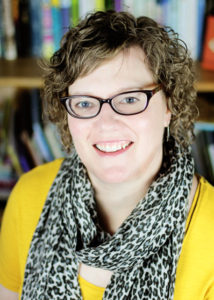 The first Industry Insider interview of 2020 is with Erin Murphy. She’s a fifth-generation Arizona native now living in southern Maine where she’s President of the Erin Murphy Literary Agency (EMLA), the company she founded in 1999. “As founder of EMLA,” she notes, “I focus not just on publishing books, but on building careers—and creating a sense of community, as well.”
The first Industry Insider interview of 2020 is with Erin Murphy. She’s a fifth-generation Arizona native now living in southern Maine where she’s President of the Erin Murphy Literary Agency (EMLA), the company she founded in 1999. “As founder of EMLA,” she notes, “I focus not just on publishing books, but on building careers—and creating a sense of community, as well.”
For those who like personal bio tidbits, Erin’s a fan of:
- reading (of course!)
- knitting
- walking
- kayaking
- traveling
- watching movies
- and “figuring out How People Work”
If you want to do a little research of your own, here are some links to do some Erin Murphy/EMLA sleuthing. But with that, it’s time for the interview!
- Website: https://emliterary.com/
- Twitter: https://twitter.com/agentemurph
RVC: Like many agents, you didn’t set out to become one. You started as an editor at a small children’s book imprint, right? How did you get from there to where you are now?
EM: I was an editor of both adult and children’s books at a small, regional house that does not exist any longer. This was more than twenty years ago. It was right at the time that publishing houses were closing to slush and suddenly children’s writers needed agents—and there weren’t very many agents who did anything at all with children’s books at the time. (Listen to me! “Back in the olden days…”) I thought I’d be an editorial freelancer focusing on regional nonfiction or adults, but instead, I decided I should try my hand at agenting and focus on children’s books.
I had only worked with a couple of agents as an editor, so honestly, I didn’t have a solid impression of what agents could do. And I had never worked in publishing in New York, so I had no contacts there. I did, however, have a solid background in negotiating and reviewing contracts, as my publishing house had revised its contract during my tenure there, and the publishing law expert who did the revision trained me thoroughly. If it hadn’t been for that, I don’t think it would have occurred to me to try being an agent.
RVC: What is it about the children’s book industry that appeals to you? For those who don’t know, your agency specializes in that area.
EM: Three primary things:
- The work we do feels very important, because we’re not just making books, we’re making books for society’s youngest members, and therefore, we are shaping the next generation. Turning kids into readers is important, important work, and providing good and fun and interesting and moving books to hook them is a necessary part of that.
- The people in children’s publishing are generally incredibly nice. The competitive spirit isn’t as driving here, and there’s a sense of success for one book/creator/agent/publisher being good for the whole industry.
- I can’t think of another job that would daily thrill my inner child so much!
RVC: How do you handle existing clients who suddenly want to branch out into writing, say, an adult thriller or a Malcolm-Gladwell-style cultural commentary book for adults?
EM: My colleague Ammi-Joan Paquette generally says, “Bring it on!” when her clients do that, and she gets to work researching appropriate editors on the adult side of publishing. I, however, usually say “Uncle!” because I don’t have time to get to know a whole new set of editorial contacts from scratch. But there have also been times when a client thought their next project might be right for adults, and it turned out it actually worked better (or just as well) on the juvenile side.
RVC: What do you say to a prospective client who wonders why you’re located in southern Maine versus, say, the Flatiron building or in a loft on 27th Avenue in NYC? (Beyond the rent being WAY better in Maine, one assumes!)
EM: Whatever editor I need to reach is just a phone call or email away. I’m not a city gal; I’m happier, and more inspired, when I’m spending most of my time in the countryside. I’ve been doing this for more than twenty years while working far from Manhattan, and it seems to have worked out all right. But listen, especially while the industry is having important conversations about how we exclude a lot of people from becoming a part of the publishing industry because of the financial hurdle of living in NYC, I would hope that “lives in NYC” is not a primary requirement of authors seeking agents. My far-flung colleagues deserve better.
RVC: Let’s talk about your agenting interests and style. Stop me if I’m way off base here, but in scrutinizing the authors/books you rep, it SEEMS like you’re often taken by quieter subjects, styles, and themes. Is that fair?
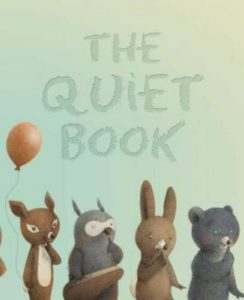 EM: I do think that’s fair, so long as it’s not all three at once. Something needs to make a book stand out and find its readership! Still, I do love being emotionally moved by a text’s subject, style, or themes—and emotion sometimes gets equated with quietness in literature. Take Deborah Underwood’s The Quiet Book as an obvious example. (I rep Deborah but signed her after The Quiet Book came out.) It has a very understated (and brilliant) writing style and the subject is literally quiet, but it taps into a universal feeling on every page. And it works so well because it’s not lacking for an obvious readership—what parent doesn’t want a book that inspires both conversation and quietness for bedtime reading?
EM: I do think that’s fair, so long as it’s not all three at once. Something needs to make a book stand out and find its readership! Still, I do love being emotionally moved by a text’s subject, style, or themes—and emotion sometimes gets equated with quietness in literature. Take Deborah Underwood’s The Quiet Book as an obvious example. (I rep Deborah but signed her after The Quiet Book came out.) It has a very understated (and brilliant) writing style and the subject is literally quiet, but it taps into a universal feeling on every page. And it works so well because it’s not lacking for an obvious readership—what parent doesn’t want a book that inspires both conversation and quietness for bedtime reading?
Don’t get me wrong—I love fantasy and high stakes. I do represent Robin LaFevers’ His Fair Assassins series, which pitches as “teenage Medieval assassin nuns,” after all—and in picture books, Shark vs. Train by Chris Barton jumps to mind as a non-quiet book! (See its companion book Fire Truck vs. Dragon, releasing in March 2020.) I just think high stakes are equally valid when they are internal, especially for kids who are figuring out the world and their place in it, and I find that very compelling.
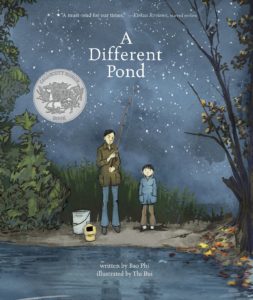 I also find it especially compelling when it concerns voices that have rarely been heard in U.S. children’s publishing. A quiet, emotional story sometimes paradoxically makes a wider window into a world that children of the dominant culture are unfamiliar with—and a more powerful mirror for the children who haven’t seen themselves in books before. (Credit to Rudine Sims Bishop for mirrors/windows!) My client Andrea Wang was inspired by Bao Phi and Thi Bui’s A Different Pond to write a story from her own childhood, about being a daughter of immigrants, which is forthcoming from Neal Porter Books (with Jason Chin illustrating)—so A Different Pond’s effects will ripple through the new book (tentatively titled Watercress) and beyond. I recently signed Kao Kalia Yang, whose stories of the refugee experience are incredibly powerful and boundary-breaking—and also very simple and poetic.
I also find it especially compelling when it concerns voices that have rarely been heard in U.S. children’s publishing. A quiet, emotional story sometimes paradoxically makes a wider window into a world that children of the dominant culture are unfamiliar with—and a more powerful mirror for the children who haven’t seen themselves in books before. (Credit to Rudine Sims Bishop for mirrors/windows!) My client Andrea Wang was inspired by Bao Phi and Thi Bui’s A Different Pond to write a story from her own childhood, about being a daughter of immigrants, which is forthcoming from Neal Porter Books (with Jason Chin illustrating)—so A Different Pond’s effects will ripple through the new book (tentatively titled Watercress) and beyond. I recently signed Kao Kalia Yang, whose stories of the refugee experience are incredibly powerful and boundary-breaking—and also very simple and poetic.
RVC: You have a rep for being an editorial agent. What does that mean to you, and what are examples of the types of things you’ll do for a client and their manuscript?
EM: Naturally I’m often aware of projects before they start or while they’re in progress and I’ll raise flags if a topic seems problematic, overdone, or not very easy to find an audience for, but that’s not what you’re asking about. I would hope that between a client telling me about an idea and me seeing a manuscript for the first time, they will have done a lot of drafting, re-drafting, throwing things out, revising further—finding what a text actually needs to be and getting it as far as they can with the help of beta readers and critique partners.
RVC: You’ve got to love how a good critique group can help get a manuscript in submission-worthy shape!
EM: Totally right! I only get one first look at a manuscript, and what I hope I will be doing with my editorial talents at that point in a picture book’s development is seeing what the author is wanting to do with it and clearing the way to make their vision even more crystallized and irresistible. I ask a lot of questions. I notice little clues the author left for their subconscious to pick up and do more with. I point out lazy writing or obvious “darlings” that the writer loves but that aren’t serving the whole. I point out brilliant writing and ask for more of it. I do a lot of suggesting the author go deeper or take ideas further. I ask them to justify their choices. Sometimes I say, “This is still just an idea, not a picture book text. Your text is talking about it, not telling a story. Go find another way in.”
RVC: So, you have an annual agency retreat. What kind of things are on the agenda each year?
EM: The retreat is a mix of scheduled and unscheduled time. The scheduled time is kind of conference-like, pulling from the expertise of the agents, special guests, and clients who are in attendance, and it’s high-level stuff—but the real magic happens in the unscheduled time, when attendees gather spontaneously or intentionally. Plot-brainstorming sessions have become staples. Readings of works in progress are beloved, and have made it easier for writers to find each other and collaborate—we have several co-written books that have resulted from the retreat.
There’s also lots of silliness and fun: goofy door prizes, a costume contest, some serious poker-playing, lots of dessert, jigsaw puzzles, drawing/painting sessions, Giant Jenga, singalongs, walks, shopping, and last year, a first-ever EMLA retreat scavenger hunt, a truly evil thing organized by a visiting editor that absolutely captivated the attendees who participated. The main thing is, people really connect there, and they come away feeling creatively rejuvenated. We’re taking 2020 off to step back and evaluate what is really working and what isn’t, and as much as the staff needs the break, we’re all going to miss it a ton, too. It’s pretty great.
RVC: Sounds like fun! What many authors tell me isn’t as much fun, though, is PR. For many, promoting themselves and their books is the biggest anxiety-causing part of the entire process. What are some of your agency’s best PR success stories?
EM: One of the best things I ever did for EMLA was set up a collaborative relationship with marketing firm Curious City and its brilliant creator, Kirsten Cappy. She takes on marketing concerns for the agency as a whole, but she also is available for our clients who need help with PR and marketing.
So, yes, book promotion can cause anxiety—it is hard to know what to do to support picture book sales and when one is doing enough—but Kirsten encourages our clients to worry less about the immediacy of PR and work more towards establishing long term tools for picture book programmers. By providing library and classrooms with engagement activities, picture books can be introduced to children and families again and again, long after release. Recently, we have had some significant sales and PR successes that were driven at least partially by the creation of those tools.
After Nancy Raines Day released a Baby & Toddler Story Hour Kit for her book Baby’s First (Charlesbridge), an early literacy program discovered the title and bought 11,000 copies.
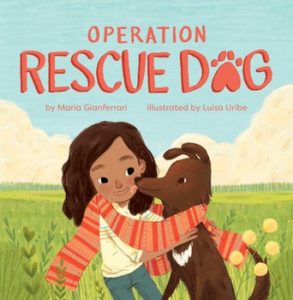 Picture book author Maria Gianferrari worked with Curious City to create a Pet Adoption Event Kit for libraries and organizations that centered on her book Operation Rescue Dog (Little Bee). Maria was invited onto the Hallmark Channel to talk about the book, and the talk show hosts celebrated Maria’s “giving back” to the community with the availability of the kit.
Picture book author Maria Gianferrari worked with Curious City to create a Pet Adoption Event Kit for libraries and organizations that centered on her book Operation Rescue Dog (Little Bee). Maria was invited onto the Hallmark Channel to talk about the book, and the talk show hosts celebrated Maria’s “giving back” to the community with the availability of the kit.
(Nancy and Maria are repped by EMLA agents Tricia Lawrence and Ammi-Joan Paquette, respectively.)
RVC: Dealbreakers in query letters, cover letters, or pitches of any type?
EM: An obvious lack of knowledge of publishing in general or children’s publishing in particular. There is no excuse for not self-educating when there is so much information that is freely available. I am not interested in dabblers!
RVC: How do you measure your clients’ success?
EM: My primary benchmark is growth. This can be growth in craft and professionalism, expanding into new formats/genres, increasing sales and recognition, coming closer to getting offers on submission, engaging with wider circles of readers and gatekeepers, etc.
RVC: Talk about the reasons for having the no open submission policy. My guess is that it’s a measured, client-focused decision that you still probably continue to revisit and debate from time to time.
EM: Actually, you’re only half right! We’ve been closed to slush since maybe my third year as an agent, and I have never once regretted the decision enough to revisit or debate it. We do take queries from people who attend conferences where we speak, and we take referrals (of which we get a lot), and when we realized how much our closed policy has been a barrier for marginalized writers, we started making a serious point of participating in online events like DVPit, doing more reach-outs, etc. There are avenues to get to us, but we aren’t dealing with nearly the quantity of queries a lot of agents are, and it allows us to have larger numbers of clients than most do. I’m answering this question during the first work week of the new year and an agent from another agency posted that he had gotten 250 queries by Thursday. I can’t fathom dealing in that volume.
RVC: It’s time for the LIGHTNING ROUND! Zippy-fast questions followed by zappy-quick responses, please. Ready?
EM: Bring it on!
RVC: Best place for pizza in your neck of the woods (Windham, ME)?
EM: This one hurts. No good answer close by—but we are fans of Otto’s if we want to go a little further.
RVC: In a parallel universe where I wasn’t involved with books at all, I’d instead be ________.
EM: A news editor in some medium or other.
RVC: Favorite non-kidlit guilty reading pleasure?
EM: Historical mysteries.
RVC: Best non-client picture book of 2019?
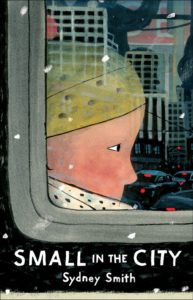 EM: Ooh, that’s not fair! One book! Okay, this is the best I can do…a tie between Saturday by Oge Mora and Small in the City by Sydney Smith.
EM: Ooh, that’s not fair! One book! Okay, this is the best I can do…a tie between Saturday by Oge Mora and Small in the City by Sydney Smith.
RVC: The #1 attribute for agenting success?
EM: Flexibility.
RVC: Three words that sum up the EMLA philosophy?
EM: Integrity, community, growth. (Or possibly “unicorns, pie, poker.”)
RVC: Way to end strong! Thanks so much, Erin!

